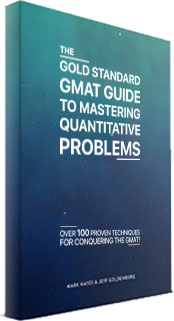
G
Jan 08, 2016
GMAT high scores
When you write GMAT test prep materials, you get asked a lot of questions. Personally, as someone who genuinely enjoys helping people, I love this aspect of my job. Today I want to address a question that comes up often. “What GMAT score do I need to be competitive?” There are a few problems with this question. For starters, everyone’s goals are different and without knowing what goal you are pursuing I cannot even begin to give you a concrete answer. Are you trying to get into a specific business school? Perhaps you are attempting to secure a particular scholarship? Without knowing what your goals are, I cannot tell you how high you need to score to “be competitive.” Moreover, your GMAT score is only one part of your application and if the rest of your application is not solid it will be difficult to land an acceptance letter.
So how do you know what score you should shoot for? The first thing that I would recommend is to familiarize yourself with the basics of how the GMAT is scored. Your GMAT results consist of an AWA writing score ranging from 0 and 6, an Integrated Reasoning (IR) score between 1 and 8, a Verbal score between 0 and 60, and a Quantitative score between 0 and 60. While your AWA and IR scores are important, let’s focus on your verbal and quant scores for now. Your verbal and quant scores contribute to your combined GMAT score which will be between 200 and 800. This is the score that is most commonly seen when you research your target school’s admissions criteria. Use this chart to calculate your combined GMAT score.
After you understand how the GMAT is scored, it is time to do a little research. Business schools report the median and average GMAT scores of their previous incoming classes. This information is typically very easy to find online. Be sure to also check their other statistics including average incoming GPA. Applicants with a high GPA may not need as high of a GMAT score as applications with a lower GPA. Use these statistics to set your goals.
The GMAT is a very important part of your business school application and you should dedicate a lot of time to study for it. However, sometimes people overlook other aspects of their application. Let’s make something clear. Earning a high GMAT score is great and will certainly help you get into the program you want, but you need to make sure that all the other parts of your application are strong as well. This includes your letters of recommendation, your essays, and your past professional and educational experiences. Scoring well on one test is not enough to guarantee that you will get into a top school.
I hope that this article helped to put you on the right track to finding the score that enables you to be competitive for the school that you want to be admitted into. Regrettably, there is not one answer to how well you need to perform on the GMAT to get into your dream school. By researching your target school’s admissions criteria you can begin to tailor not only your GMAT expectations, but also your entire application to meet these goals. Do you have your heart set on a specific GMAT score? Let us know what you are shooting for in the comments below.
So how do you know what score you should shoot for? The first thing that I would recommend is to familiarize yourself with the basics of how the GMAT is scored. Your GMAT results consist of an AWA writing score ranging from 0 and 6, an Integrated Reasoning (IR) score between 1 and 8, a Verbal score between 0 and 60, and a Quantitative score between 0 and 60. While your AWA and IR scores are important, let’s focus on your verbal and quant scores for now. Your verbal and quant scores contribute to your combined GMAT score which will be between 200 and 800. This is the score that is most commonly seen when you research your target school’s admissions criteria. Use this chart to calculate your combined GMAT score.
After you understand how the GMAT is scored, it is time to do a little research. Business schools report the median and average GMAT scores of their previous incoming classes. This information is typically very easy to find online. Be sure to also check their other statistics including average incoming GPA. Applicants with a high GPA may not need as high of a GMAT score as applications with a lower GPA. Use these statistics to set your goals.
The GMAT is a very important part of your business school application and you should dedicate a lot of time to study for it. However, sometimes people overlook other aspects of their application. Let’s make something clear. Earning a high GMAT score is great and will certainly help you get into the program you want, but you need to make sure that all the other parts of your application are strong as well. This includes your letters of recommendation, your essays, and your past professional and educational experiences. Scoring well on one test is not enough to guarantee that you will get into a top school.
I hope that this article helped to put you on the right track to finding the score that enables you to be competitive for the school that you want to be admitted into. Regrettably, there is not one answer to how well you need to perform on the GMAT to get into your dream school. By researching your target school’s admissions criteria you can begin to tailor not only your GMAT expectations, but also your entire application to meet these goals. Do you have your heart set on a specific GMAT score? Let us know what you are shooting for in the comments below.

